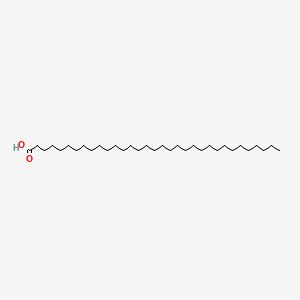| MeSH term | MeSH ID | Detail |
|---|---|---|
| Diabetes Mellitus, Type 2 | D003924 | 87 associated lipids |
| Body Weight | D001835 | 333 associated lipids |
| Hypercholesterolemia | D006937 | 91 associated lipids |
tritriacontanoic acid
tritriacontanoic acid is a lipid of Fatty Acyls (FA) class. Tritriacontanoic acid is associated with abnormalities such as hypercholesterolemia, Metabolic syndrome, Diabetes Mellitus, Non-Insulin-Dependent, Diabetes Mellitus, Insulin-Dependent and Parkinson Disease. The involved functions are known as Fermentation, Process, Longterm Effects, Pressure- physical agent and Lipid Metabolism. Tritriacontanoic acid often locates in Blood, Tissue fiber and A Fibers. The associated genes with tritriacontanoic acid are STN gene. The related lipids are Total cholesterol and blood lipid.
Cross Reference
Introduction
To understand associated biological information of tritriacontanoic acid, we collected biological information of abnormalities, associated pathways, cellular/molecular locations, biological functions, related genes/proteins, lipids and common seen animal/experimental models with organized paragraphs from literatures.
What diseases are associated with tritriacontanoic acid?
tritriacontanoic acid is suspected in hypercholesterolemia, Metabolic syndrome, Diabetes Mellitus, Non-Insulin-Dependent, Diabetes Mellitus, Insulin-Dependent, Parkinson Disease and other diseases in descending order of the highest number of associated sentences.
Related references are mostly published in these journals:
| Disease | Cross reference | Weighted score | Related literature |
|---|
Possible diseases from mapped MeSH terms on references
We collected disease MeSH terms mapped to the references associated with tritriacontanoic acid
PubChem Associated disorders and diseases
What pathways are associated with tritriacontanoic acid
There are no associated biomedical information in the current reference collection.
PubChem Biomolecular Interactions and Pathways
Link to PubChem Biomolecular Interactions and PathwaysWhat cellular locations are associated with tritriacontanoic acid?
Visualization in cellular structure
Associated locations are in red color. Not associated locations are in black.
Related references are published most in these journals:
| Location | Cross reference | Weighted score | Related literatures |
|---|
What functions are associated with tritriacontanoic acid?
Related references are published most in these journals:
| Function | Cross reference | Weighted score | Related literatures |
|---|
What lipids are associated with tritriacontanoic acid?
Related references are published most in these journals:
| Lipid concept | Cross reference | Weighted score | Related literatures |
|---|
What genes are associated with tritriacontanoic acid?
Related references are published most in these journals:
| Gene | Cross reference | Weighted score | Related literatures |
|---|
What common seen animal models are associated with tritriacontanoic acid?
There are no associated biomedical information in the current reference collection.
NCBI Entrez Crosslinks
All references with tritriacontanoic acid
Download all related citations| Authors | Title | Published | Journal | PubMed Link |
|---|---|---|---|---|
| Clausen MR and Mortensen PB | Fecal ammonia in patients with adenomatous polyps and cancer of the colon. | 1992 | Nutr Cancer | pmid:1437654 |
| Roberts-Andersen J et al. | Reduction of DMH-induced colon tumors in rats fed psyllium husk or cellulose. | 1987 | Nutr Cancer | pmid:2819829 |
| Nakamura Y et al. | Beta-sitosterol from psyllium seed husk (Plantago ovata Forsk) restores gap junctional intercellular communication in Ha-ras transfected rat liver cells. | 2005 | Nutr Cancer | pmid:15860444 |
| Mullin GE | Supplements for weight loss: hype or help for obesity? Part III. | 2015 | Nutr Clin Pract | pmid:25888621 |
| King DE and DeLegge M | The impact of fiber supplementation on ADMA levels. | 2009 Feb-Mar | Nutr Clin Pract | pmid:19244152 |
| Ganji V and Kuo J | Serum lipid responses to psyllium fiber: differences between pre- and post-menopausal, hypercholesterolemic women. | 2008 | Nutr J | pmid:18727833 |
| Abutair AS et al. | Soluble fibers from psyllium improve glycemic response and body weight among diabetes type 2 patients (randomized control trial). | 2016 | Nutr J | pmid:27733151 |
| Ogata M et al. | Dietary psyllium fiber increases intestinal heat shock protein 25 expression in mice. | 2017 | Nutr Res | pmid:28385286 |
| Pal S et al. | Effect on Insulin, Glucose and Lipids in Overweight/Obese Australian Adults of 12 Months Consumption of Two Different Fibre Supplements in a Randomised Trial. | 2017 | Nutrients | pmid:28146065 |
| Bernstein AM et al. | Major cereal grain fibers and psyllium in relation to cardiovascular health. | 2013 | Nutrients | pmid:23628720 |
